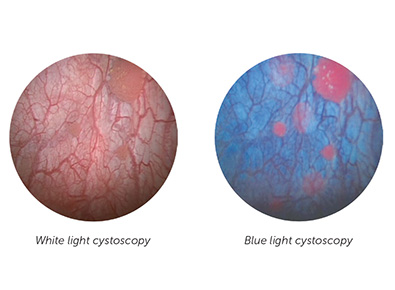According to the American Cancer Society, an estimated 80,000 new cases of bladder cancer will be diagnosed this year, with more than 3,000 of those cases being diagnosed across Georgia and Alabama.
As startling as these statistics are, they shed light on the growing necessity to have local access to bladder cancer care programs that can effectively treat these cases, as well as the need for people to learn more about the disease that’s affecting so many in our region.
What is bladder cancer?
Bladder cancer is cancerous growth that’s found in either the inner lining or outer walls of the bladder tissue. The bladder is a small organ that’s about the size of a softball and is situated inside the pelvic area. As one of the primary parts of the urinary system, it’s responsible for holding urine and ridding the body of waste fluids. As a result, the bladder becomes susceptible to tumors and abnormal growths. The bladder wall is made up of multiple layers, and cancer often starts in the inner lining, which is referred to as non-muscle invasive because it has not spread into the walls of the bladder.
What are the signs and symptoms of bladder cancer?
There are several signs and symptoms associated with bladder cancer, including:
- Blood in the urine
- Frequent urination
- Pain or burning during urination
- Lower abdominal pain
Schedule an appointment with your healthcare provider or a urinary health specialist if you experience any of the above symptoms. These symptoms are associated with bladder cancer; however, they could also indicate other issues or conditions. Consult with a urology specialist to determine the cause of your symptoms and ask if you could be at risk for bladder cancer.
What factors increase the risk for developing bladder cancer?
The risk for bladder cancer increases as you age. It’s also found among men more often than women, and even more often in men age 50 and older. However, gender and age aren’t the only factors that increase the risk for developing the disease. Other risk factors include:
- Tobacco use
- Chronic or recurrent urinary infections
- History of bladder cancer or other urothelial cancers
- Exposure to certain kinds of chemotherapy, including radiation
- Family history of bladder cancer and genetics
- Age
How is bladder cancer diagnosed?
Doctors use a variety of tests and exams to diagnose bladder cancer. One of the most key diagnostic exams is called a cystoscopy, where a physician inserts a narrow instrument equipped with a small camera and bright white light into the bladder through the urethra. This allows physicians to view the bladder from the inside and spot tumors and abnormal growths.
There’s now an advanced cystoscopy available called a Blue Light Cystoscopy that’s helping physicians find cancerous tumors with greater accuracy than with standard white light cystoscopies, where cancers that appear the same color as surrounding healthy tissue could be missed.
Blue Light Cystoscopy
Blue Light Cystoscopy with Cysview significantly improves the detection of non-muscle invasive bladder cancer better than standard white light exams alone. During the exam, physicians use standard white light and advanced blue light technology to illuminate hard-to-see cancerous areas, which “glow” bright pink in the instrument’s blue light.

Following a diagnosis, a physician will likely order additional tests to further diagnose and stage the cancer to develop a comprehensive treatment plan, which could include a biopsy to help them learn more about the tumor.
Can bladder cancer be prevented?
Some risk factors for bladder cancer, including age, gender, race and family history, are beyond your control, but there are things you can do that could help lower your risk.
- Don’t smoke. Tobacco use is the No. 1 cause of bladder cancer.
- If you work in an industry around certain chemicals, ensure that you’re following proper safety precautions to limit your exposure to workplace chemicals. Be sure your physician knows which chemicals you work around so he or she can provide additional guidance on screenings.
- Drink plenty of water. Water is necessary for our bodies and it’s essential to a healthy urinary tract and bladder.
Call 678-661-2813 to schedule an appointment with a specialist at Tanner Urology Care to learn more about your risk for bladder cancer. To learn more about Blue Light Cystoscopy at Tanner, visit tanner.org/bluelight.